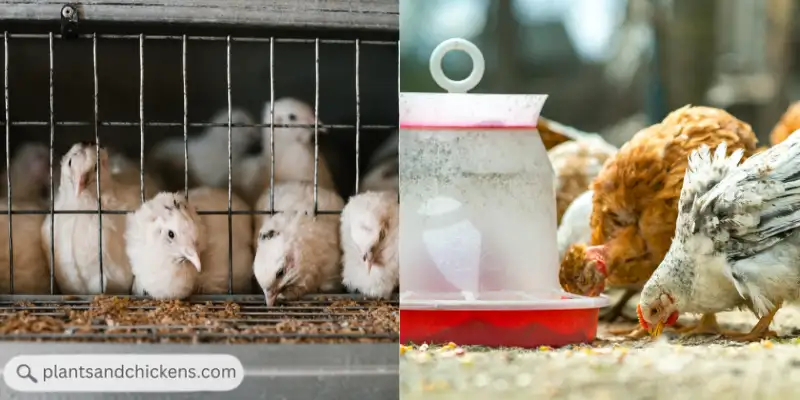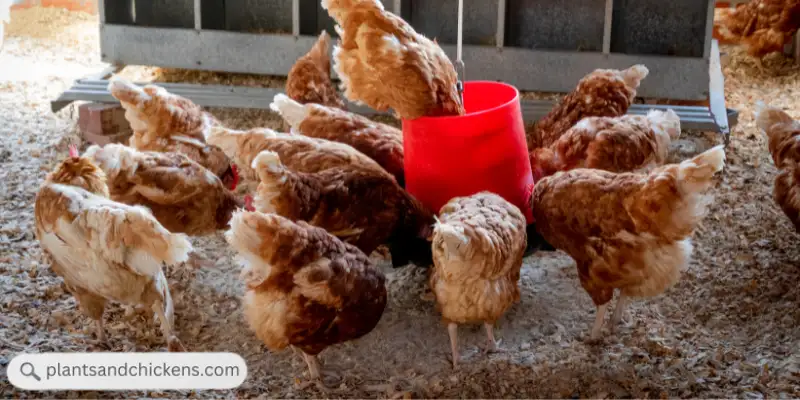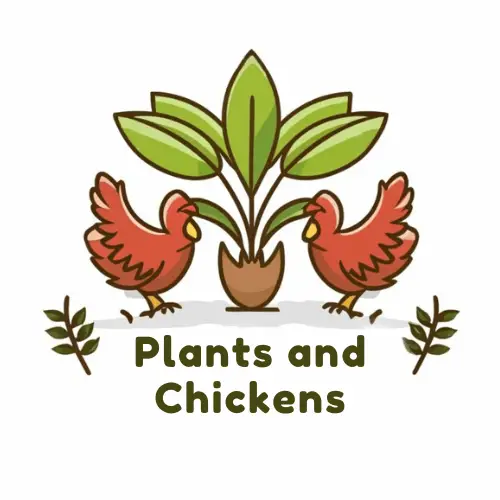If you are looking for what to feed a mixed flock of hens And roosters? Your search stops here! For a mixed flock of hens and roosters, feed them a balanced diet of layer pellets or crumbles along with insoluble grit and plenty of fresh water. This will provide the necessary nutrients for both the hens to lay eggs and for the roosters to maintain their health and vitality.
Additionally, you can supplement their diet with treats like fruits, vegetables, grains, and mealworms. Just make sure to avoid feeding them too much scratch, as it is high in carbohydrates and low in protein. By providing a well-rounded and nutritionally balanced diet, you can keep your mixed flock healthy and thriving.
Table of Contents
Understanding The Nutritional Needs Of Mixed Flocks
A mixed flock of hens and roosters comes with its own set of challenges when it comes to providing them with the proper nutrition. Differentiating between the nutritional needs of hens and roosters is essential in ensuring that every bird in the flock receives the right balance of nutrients for optimal health and productivity.
Differentiating Between Hens And Roosters
Although hens and roosters may share similarities in their dietary requirements, there are a few key differences to consider. Hens, being the egg-laying members of the flock, need a diet that is specifically formulated to support their egg production. This means that hens require higher levels of protein and calcium compared to roosters.
Factors Affecting Nutritional Requirements
- Age: The age of the birds plays a significant role in their nutritional needs. Younger birds, such as chicks and growers, require feed with higher protein content to support their rapid growth and development. Mature birds, on the other hand, have different requirements depending on whether they are hens or roosters.
- Breeding: If you plan on breeding your mixed flock, it’s important to provide them with a well-balanced diet that meets their reproductive needs. Specialized feeds designed for breeding birds can help support fertility and successful hatchability.
- Activity Level: The activity level of the birds can also impact their nutritional requirements. Birds that have more space to roam and forage may have lower energy needs compared to those that are confined to a smaller area.
- Health Status: The health status of the birds should always be taken into consideration when determining their nutritional requirements. Birds that are recovering from an illness or injury may require additional nutrients to support their healing process.
To ensure that all the birds in your mixed flock are getting the nutrients they need, it’s important to provide a well-balanced diet that meets their specific requirements. This can be achieved by offering a combination of commercial feed formulated for each life stage, along with access to fresh water and supplemental treats. Additionally, providing hens with calcium-rich sources such as oyster shells can help support their eggshell formation.

Feeding Recommendations For Mixed Flocks
When it comes to feeding a mixed flock of hens and roosters, it is essential to provide balanced nutrition to ensure their overall health and productivity. By following these feeding recommendations, you can ensure that each bird receives the necessary nutrients:
Protein-rich Feed For Balanced Nutrition
Offering a protein-rich feed is crucial for the well-being of your mixed flock. This type of feed provides the necessary amino acids for growth, maintenance, and reproduction. Look for feeds specifically formulated for mixed flocks to meet their nutritional requirements.
Recommended Feeds:
Purina Flock Raiser Crumbles
Nutrena NatureWise All Flock Poultry Feed
Purina Flock Block
Purina Flock Raiser Pellets
Offering A Variety Of Foods
In addition to the main feed, it is important to offer a variety of supplemental foods to provide enrichment and ensure balanced nutrition for your mixed flock. This includes fruits, grains, mealworms, and vegetables like carrots and grapes.
Recommended Supplemental Foods:
- Mealworms
- Fruits
- Grains
- Sunflower seeds
- Grapes
- Carrots
Providing Adequate Water And Grit
Water is essential for the overall health and well-being of your flock. Make sure to provide clean and fresh water daily. Additionally, supplying insoluble grit helps hens and roosters properly digest their food, as it helps break down grains and other feed particles in their gizzard.
Recommended Grit:
- Insoluble grit
By adhering to these feeding recommendations and providing a protein-rich feed, a variety of foods, and adequate water and grit, you can ensure that your mixed flock of hens and roosters stay healthy and productive. Happy flock, happy farmers!

Considerations For Special Dietary Needs
When considering what to feed a mixed flock of hens and roosters, it is important to provide a balanced diet that meets the nutritional needs of both genders. This can include a combination of layer feed, grains, fruits, vegetables, and protein sources like mealworms.
Providing a variety of options ensures that all birds receive the necessary nutrients for optimal health and egg production.
Supplementing With Calcium For Egg Production
One important consideration for feeding a mixed flock of hens and roosters is ensuring adequate calcium intake for egg production. Hens require higher levels of calcium to lay strong and healthy eggs. To supplement their calcium needs, you can provide oyster shells, which are an excellent source of calcium. Additionally, you can offer crushed eggshells, which can be a great natural source of calcium for your flock.
It’s essential to offer calcium supplements separately from the regular feed. You can place the oyster shells or crushed eggshells in a separate container, allowing the hens to consume them voluntarily, as they have a natural instinct to self-regulate their calcium intake.
Managing Dietary Restrictions
In a mixed flock, it’s not uncommon for some individuals to have specific dietary restrictions. For instance, if you have a hen with egg-laying problems or a rooster with a sensitive digestive system, it’s crucial to address their unique needs. One recommended solution is to offer a specialized diet for those specific birds.
You can find commercial feeds formulated for chickens with specific dietary restrictions, such as low protein feeds or feeds with added supplements. These specialized feeds provide the necessary nutrition while accommodating the dietary limitations of certain birds in your mixed flock. Consulting a veterinarian or poultry nutritionist can help determine the best feed options for your birds with dietary restrictions.
Addressing Individual Health Concerns
Just like humans, chickens can have individual health concerns that require additional attention. For example, some birds may be prone to feather-pecking, which can lead to skin irritation and bald patches. Others may suffer from joint issues or have weaker immune systems.
In such cases, it’s important to consider their individual health concerns when planning their diet. You can include supplements such as omega-3 fatty acids or probiotics in their feed to support overall health. Additionally, adding herbs such as oregano or garlic to their diet can provide natural immune-boosting properties.
Always consult with a poultry veterinarian or expert to address specific health concerns and determine the best dietary approach for your mixed flock.
Frequently Asked Questions Of What To Feed A Mixed Flock Of Hens And Roosters
What Do You Feed A Mixed Chicken Flock?
Feed your mixed chicken flock a balanced diet that includes layer pellets for adults, grower feed for young chickens, and supplement with calcium, grit, fruits, grains, and vegetables. Avoid feeding the wrong diet for the wrong life stage to keep them healthy.
What Do You Feed Chickens At Different Stages?
Feed your chickens according to their life stages. Provide adult layer pellets for laying hens and mixed-age flocks. Roosters and hens enjoy scratch, corn, millet, sunflower seeds, and oyster shells. Grower feed is suitable for young chickens. Remember to supplement with calcium and appropriate-sized grit for laying hens.
What Is Rooster’s Favorite Food?
Roosters have individual food preferences. They typically forage for plants, worms, and bugs and enjoy scratch, such as corn, millet, sunflower seeds, and oyster shells, for the necessary nutrients.
Can You Keep Roosters And Chickens Together?
Yes, you can keep roosters and chickens together as long as they respect each other’s positions within the flock. Roosters often act as mediators and peacekeepers.
Conclusion
Feeding a mixed flock of hens and roosters requires careful consideration to ensure that all birds receive the nutrients they need. By providing a balanced diet with a combination of layer feed, grower feed, and additional treats, you can support the health and productivity of your flock.
It’s important to avoid feeding the wrong diet for the wrong life stage, as this can lead to nutritional deficiencies or other health issues. Remember to provide insoluble grit and plenty of fresh water to aid digestion. By following these guidelines, you can keep your mixed flock happy and healthy.


![Terrifying Trend: Why Do Roosters Chase Humans? [2024]](https://plantsandchickens.com/wp-content/uploads/2024/02/why-do-roosters-chase-humans-4.webp)


Leave a Reply